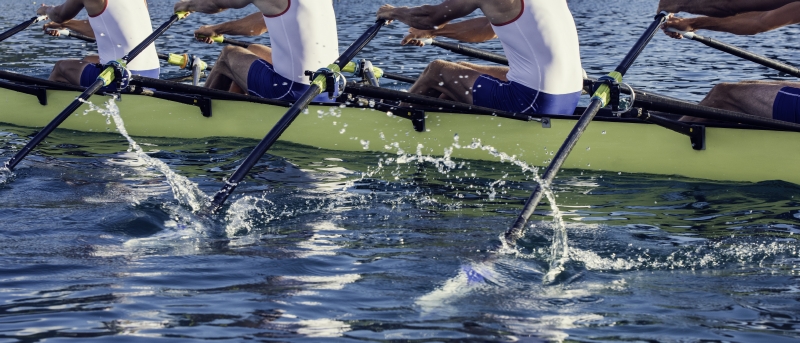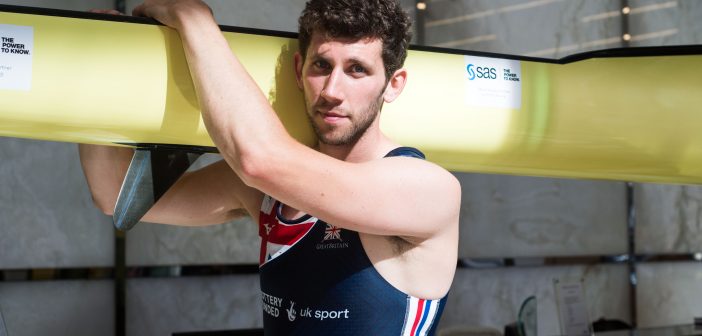By David Smith
Rowing is a “data rich sport” and multiple data sources are already being analysed by British Rowing, in particular to understand more about elite level performance. The more the coaches understand about what the data tells them, the more they can combine it with their own expertise to make better, evidence-based decisions that improve training and improve competition performance. But the sport, like many businesses, might also be set to benefit from a technology that’s not short of hype – Artificial Intelligence (AI).
Louise Kingsley, British Rowing’s Development Pathway and Paralympic Programme Manager, understands more than most that rowing is a “data rich sport”, collecting a wide variety of information from biomechanical statistics and historical race performance, to strength and conditioning output and even psychological data.
Although Kingsley freely admits that in the past this data output hadn’t been fully exploited, since 2004, British Rowing coaches have been making strides to improve this through an Athlete Longitudinal Profiling project. This tracks data of both elite athletes and rowers on the Development Pathway scheme, to identify those prospects most likely to achieve success at the highest level.
Using analytics to improve the team
“Project ALP”, as it’s known at British Rowing’s Caversham training base, has tested nearly 1,000 athletes since its inception, including 248 in 2018 (as of May 1, 2018), and allows coaches to build an extensive profile on each rower in the database, highlighting their key strengths and weaknesses. This analysis provides a deeper understanding of the training and race trends of each athlete over time, ultimately improving the quality of rowers in the national team, with the backing of empirical statistical evidence.
The success of the GB Rowing Team at the four Olympic Games since the project began is proof that it’s already paying dividends, however Kingsley and her team understand that individual profiling can only take them so far, particularly for a sport where the majority row as part of a crew.
As part of the recent partnership extension with British Rowing, SAS will continue working as the Official Analytics Partner until at least 2020. This will help staff to analyse the more general, rather than individual, trends to exploit the data over the longer term, ultimately helping to make the boat go faster through multiple marginal gains.
| British Rowing Medal Count at Summer Olympic & Paralympic Games | ||||||||
| Olympics | Paralympics | |||||||
| Games | Gold | Silver | Bronze | Total | Gold | Silver | Bronze | Total |
| Athens 2004 | 1 | 2 | 1 | 4 | ||||
| Beijing 2008 | 2 | 2 | 2 | 6* | 2 | 0 | 1 | 3* |
| London 2012 | 4 | 2 | 3 | 9* | 1 | 0 | 0 | 1 |
| Rio 2016 | 3 | 2 | 0 | 5* | 3 | 0 | 1 | 4 |
*Topped rowing medal table
Can AI help discover future champions?
SAS will specifically be used for deeper levels of data analysis as part of Project ALP, helping the team develop talent in the long term for future Olympics in Paris, Los Angeles and beyond. However, as technology advances and AI becomes more mainstream, can it be used to help to unearth the next generation of rowing champions?
With the amount of data that SAS software could analyse, not only from training sessions on the water and the ergo machines, but also through wearable technology which helps to monitor sleep cycles and recovery speeds, a complete picture of an athlete’s progression could be measured. This opens the door to the possibility of AI technology helping refine and optimize training programmes for each individual based on this wide dataset.
Could AI also provide important training interventions that traditional coaching methods cannot always identify? Rowing has unique demands as it is classified as a ‘strength endurance’ sport – perhaps AI could analyse multiple datasets and help highlight particular athlete’s unique strengths and weaknesses. This knowledge could help to focus an athlete’s training regime on areas needing improvement so that each output is pushed to the required level, increasing the chances of sustained success.
Predicting the future rate of progression with AI
Equally, as the technology progresses, Kingsley considers whether we could one day use AI to “predict the future rate of progression of international racing,” and better understand the race times required to win gold medals at the Olympics and World and European Rowing Championships – rather than simply looking backwards at historical race data.
We already know that during the 16 years between the Athens and Rio Games, gold medal times have continued to fall, highlighted by the eight second difference in time between the Men’s Coxless Four crew in 2016 compared with their 2004 counterparts. This trend has been mirrored in Para-rowing, where female scullers now need to hit the same time to win gold as their male counterparts did 10 years ago.
With this knowledge, AI could be used to give a more accurate prediction of the times needed over the next 10 years, setting athletes more meaningful goals and providing an even more accurate prediction of where they can expect to place in elite, international racing.
Just 10 years ago the thought of using AI to analyse athlete performance might have seemed far-fetched, yet the same could have been said 15 years ago about current data analysis in sport. The technology is undoubtedly improving and the prospect of individually tailored training regimes and more accurate predictions for setting targets could keep British Rowing on top of the medal table for a few years yet.
Here you can read some more exciting examples of using analytics in sports.



2 Comments
Artificial intelligence is now in every filed and the effect of the AI can be seen and many big organizations are having the AI technology in their work filed. As we can see that how AI is being implemented in the rowing and use of the AI also going to be in the non-tech field. AI is the future and the future is full of highly advanced technology and the use of the AI will be much more than it is today.
good article thanks for sharing. very helpful